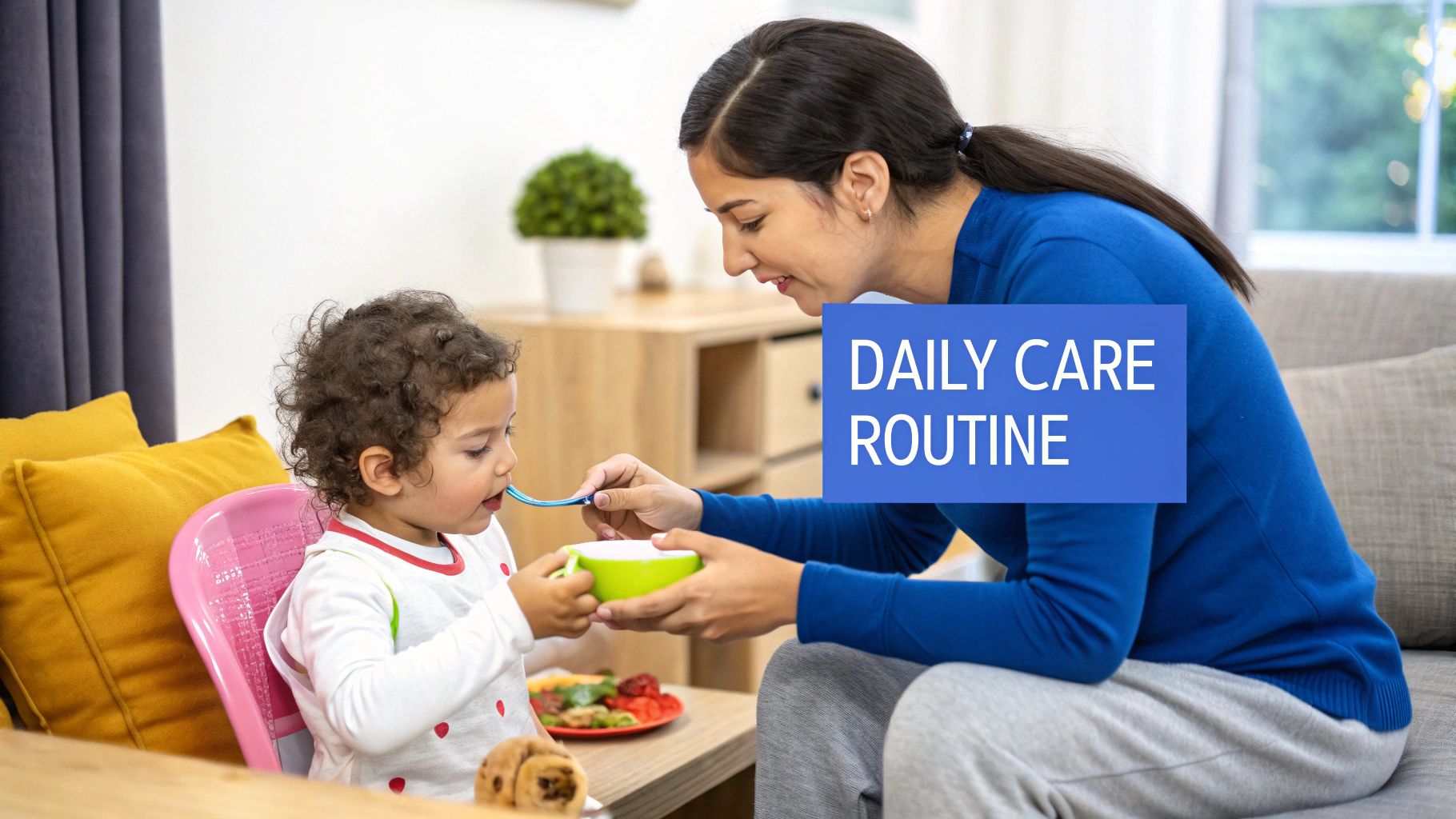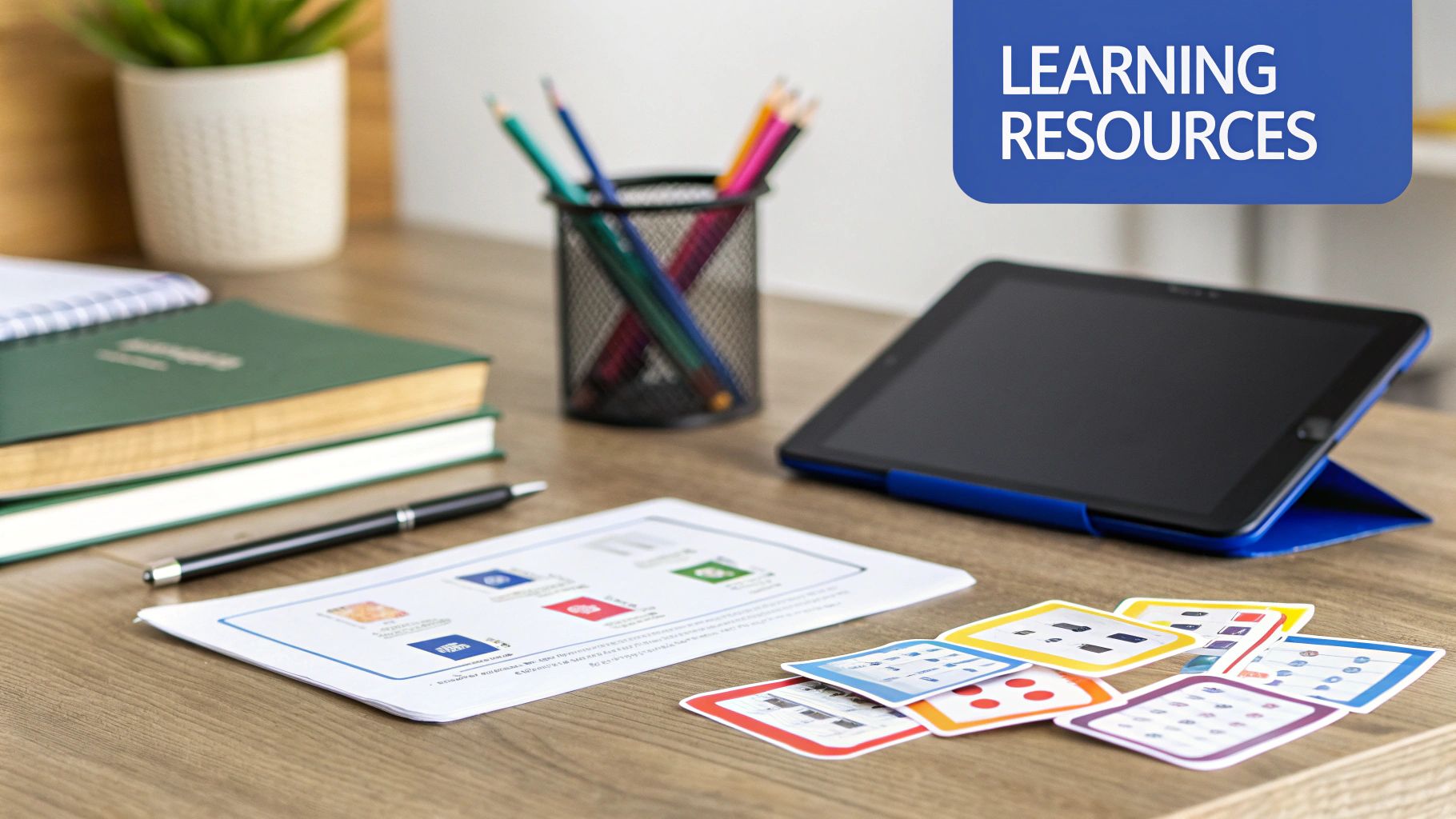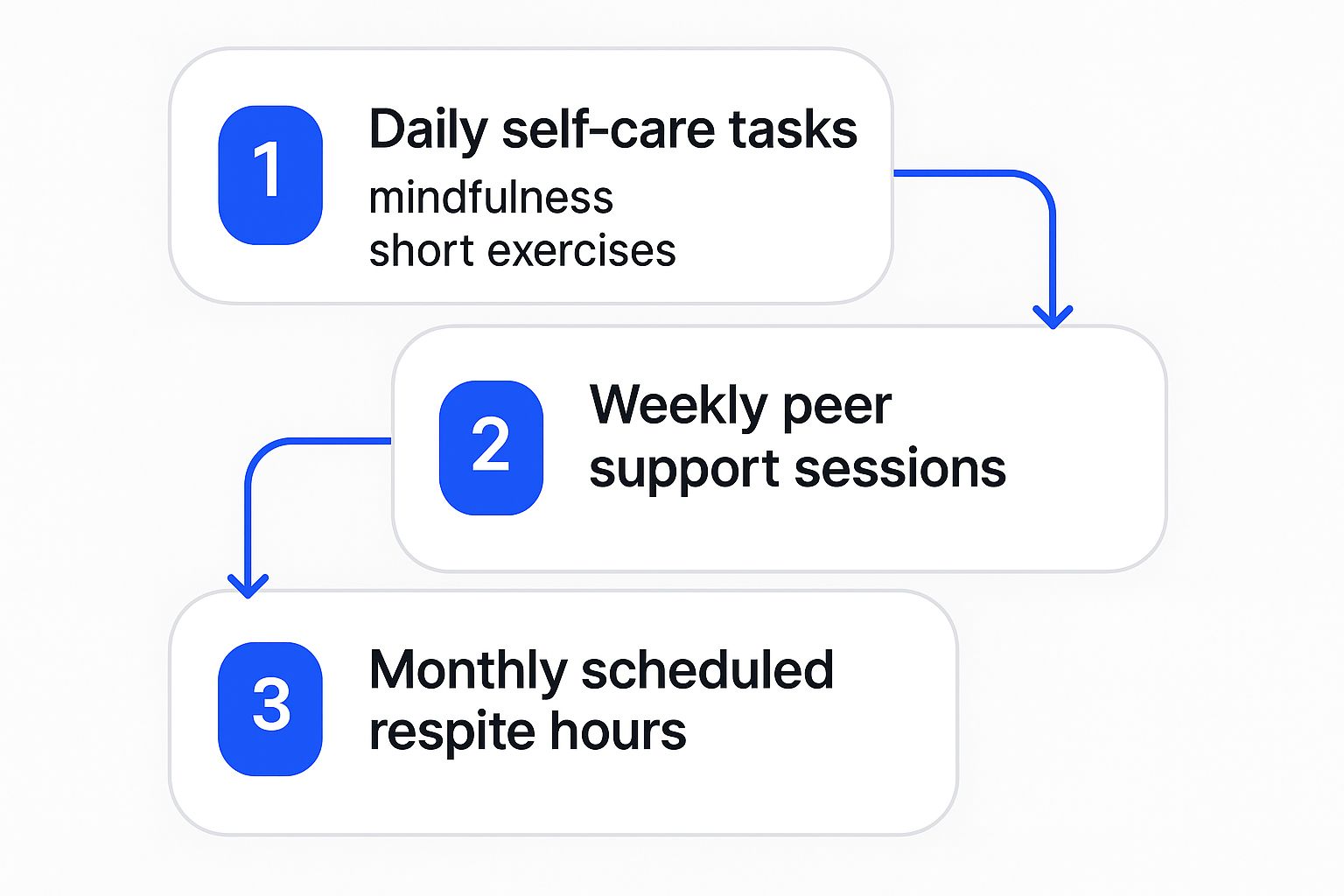A caregiver for special needs is a professional trained to provide specialized, adaptive support for individuals facing physical, developmental, emotional, or cognitive challenges. They're much more than a helper; they are a strategic partner who works to boost independence, ensure safety, and improve the quality of life for the entire family.
What a Special Needs Caregiver Really Does
When you think about hiring a caregiver for a loved one, it’s easy to picture someone handling basic tasks like supervision or meal prep. While that’s part of it, the true role is so much deeper and more impactful. A great caregiver acts less like a babysitter and more like a dedicated coach for your loved one's daily success and well-being.
The job is incredibly dynamic and requires a unique blend of skills that have to be adapted to each person's specific needs. For example, the support needed for a child with autism spectrum disorder is completely different from the care required by an adult with mobility limitations or a senior navigating dementia. At its core, their work is all about creating a supportive environment where your loved one can truly thrive.
Fostering Independence and Growth
One of the main goals for a special needs caregiver is to build skills, not just manage a to-do list. Think of them as a personal coach who breaks down big activities into small, manageable steps. Instead of just dressing a child, they might patiently guide them through the process, celebrating small wins like buttoning a shirt or tying a shoe. This step-by-step encouragement fosters a powerful sense of accomplishment and self-reliance.
This focus on empowerment touches every part of life:
- Life Skills: Helping with personal hygiene, making meals, and doing household chores in a way that encourages participation and learning.
- Social Interaction: Creating positive social experiences, whether that means navigating a playground, joining a community group, or just practicing conversation skills.
- Therapeutic Support: Reinforcing the exercises and strategies recommended by occupational, physical, or speech therapists, making sure therapy becomes a consistent part of the daily routine.
Ensuring a Safe and Structured Environment
For many people with special needs, predictability and safety are everything. A caregiver becomes the architect of this stable world. They are experts at creating and maintaining routines that lower anxiety and help manage difficult behaviors. You could almost think of them as an air traffic controller, calmly directing the day's events to ensure a smooth, safe journey from morning to night.
A great caregiver doesn't just react to problems; they proactively build a world where problems are less likely to happen. They anticipate needs, de-escalate potential triggers, and create a sanctuary of calm and predictability.
This involves constant awareness and a deep understanding of the individual’s unique triggers and comforts. It’s about more than just physical safety—it's about creating an emotionally secure space where your loved one feels understood, respected, and protected. In doing so, they become an invaluable extension of your family, transforming daily life for everyone.
Navigating Daily Responsibilities and Care

If you're picturing a rigid checklist of duties for a caregiver for special needs, you'll have to think again. The role is anything but one-size-fits-all.
A caregiver’s day is shaped entirely by the individual they support. Their responsibilities flow with the rhythm of that person's life, focusing on specific goals and immediate needs rather than a generic to-do list.
Think about it this way: a caregiver helping a child with autism might spend their day maintaining structured routines and using visual schedules to prevent sensory overwhelm. On the other hand, a caregiver for an adult with mobility challenges will focus on physical support, like ensuring the home is safe and assisting with transfers. No two days, and no two clients, are ever the same.
Core Pillars of Daily Care
While every care plan is unique, the daily tasks generally fall into a few key categories. These pillars form the foundation of a caregiver's support system, with each one tailored to the individual's abilities and personal goals.
1. Personal Care and Assistance
This is often the most hands-on part of the job, and it’s all centered on dignity and respect. It involves helping with activities of daily living (ADLs) that a person can't manage on their own.
- Hygiene and Grooming: Helping with bathing, dressing, and dental care in a way that feels comfortable and empowering.
- Mobility Support: Assisting with moving around the home, transferring from a bed to a wheelchair, and safely using mobility aids.
- Meal Preparation and Nutrition: Planning and cooking meals that meet specific dietary needs and providing feeding assistance when necessary.
2. Health and Medication Management
A great caregiver is often the frontline observer of a person's health. Their sharp eye and diligence are crucial for spotting changes and preventing bigger issues down the road.
- Administering Medications: Making sure the right dosages are given at the right times, exactly as prescribed by doctors.
- Monitoring Health: Watching for any changes in condition, tracking vital signs, and documenting symptoms to report back to family and healthcare providers.
- Coordinating Appointments: Scheduling and accompanying the individual to doctor visits, therapy sessions, and other important appointments.
Implementing Therapeutic and Developmental Goals
Beyond the daily essentials, a special needs caregiver plays a huge role in their client's long-term progress. They act as a bridge between therapists and everyday life, turning professional guidance into consistent, real-world practice.
This means their job isn't just about getting tasks done—it's about creating opportunities for growth. If a physical therapist assigns specific stretches, the caregiver will weave them into the morning routine. If a speech therapist provides communication exercises, the caregiver will practice them during meals or playtime. This constant reinforcement helps build new skills and boost confidence.
A caregiver’s true value lies in their ability to weave therapeutic goals into the fabric of everyday life, making progress a natural and continuous part of the day rather than an isolated task.
This takes incredible patience and a lot of creativity. It’s about figuring out what motivates someone and turning a challenging exercise into an activity they actually enjoy.
The Broader Scope of Support
The impact of a caregiver extends far beyond just one person—it touches the entire family. The scale of this is massive; roughly 39.8 million adults in the U.S. are caregivers for adults with disabilities or illnesses. The commitment can be intense, with some groups, like African-American caregivers, spending an average of 30 hours per week on care tasks. You can explore more about these caregiving statistics and see how they affect different communities.
This really highlights the vital role professional caregivers play. They provide not just direct support but also give family members essential respite. They manage household tasks, provide transportation, and offer the kind of companionship that enriches a person's social life.
Ultimately, a skilled and compassionate caregiver for special needs helps create a stable, supportive, and thriving environment for everyone involved.
Identifying Essential Caregiver Skills and Qualifications

When you start looking for a caregiver for special needs, it's easy to get overwhelmed by a long list of qualifications. The trick is to figure out what really matters for your family's unique situation. It’s a lot like hiring for any critical role—you have to look past the resume to find someone with both the right credentials and the right character.
Finding the perfect caregiver means striking a balance between two equally important skill sets. You have the concrete, teachable abilities—the "hard skills"—and then you have the "soft skills," which are the personality traits that define how a person connects with others. Both are absolutely essential for a successful and trusting caregiving relationship.
Think about it: a caregiver who is technically skilled but lacks empathy will never build a genuine bond. On the flip side, a kind and patient person without proper safety training might not be prepared to handle an emergency. The goal is to find a professional who offers a seamless blend of both.
The Foundation of Hard Skills
Hard skills are the tangible, verifiable qualifications a caregiver brings to the job. These are the credentials you can see on paper, and they form the bedrock of safety and competence. Think of them as the non-negotiable tools in their professional toolkit.
A few key hard skills to look for include:
- First Aid and CPR Certification: This one is a must. An up-to-date certification proves they are ready to handle medical emergencies, from minor scrapes to more serious situations.
- Specific Medical Training: Depending on your loved one’s needs, you might require a caregiver experienced with tube feeding, catheter care, seizure management, or giving injections.
- Safety and Crisis Intervention: Training in de-escalation techniques or how to safely assist with mobility can be critical, especially for individuals with behavioral challenges or physical limitations.
These skills provide the foundation for high-quality care, giving you peace of mind that your loved one is in capable hands. As you review candidates, you can learn more about the specific qualifications offered by NJ Caregiving professionals.
The Power of Soft Skills
While hard skills cover what a caregiver can do, soft skills are all about how they do it. These are the character traits that elevate a good caregiver to a truly great one. They're harder to measure, but they are often the deciding factor in whether someone is the right fit for your family.
Soft skills are the bridge between competence and compassion. They transform routine care into a supportive, nurturing relationship built on trust and mutual respect.
Imagine a day when your loved one is feeling frustrated or withdrawn. A caregiver with strong problem-solving skills might creatively adapt an activity to match their mood. Someone with deep empathy will sense when to offer a comforting word and when to simply give them space. You can't learn these things from a textbook; they come from experience and a genuinely compassionate spirit.
Essential soft skills to prioritize:
- Patience and Empathy: The ability to stay calm and understanding, even during the toughest moments.
- Communication: Clearly and kindly interacting with your loved one and keeping the family in the loop.
- Adaptability: Being flexible enough to adjust routines and plans when the unexpected happens.
- Creative Problem-Solving: Finding clever solutions to everyday challenges and roadblocks.
Ultimately, the best caregiver for special needs is someone who combines technical know-how with a compassionate heart. By carefully evaluating both hard and soft skills, you can find a professional who isn't just qualified on paper but is also a perfect fit for your family's home and heart.
Why Finding the Right Caregiver Is So Challenging
If you're finding the search for the perfect caregiver for special needs to be an uphill battle, you are far from alone. The whole process can feel completely overwhelming. It’s a deeply personal decision, and the market realities just make it tougher.
You aren’t just posting a job opening; you’re inviting someone into your home and trusting them with a vulnerable member of your family. The stakes are incredibly high. That emotional weight adds a layer of pressure to an already difficult search, so understanding what you're up against can help you move forward with a bit more clarity and patience.
A Growing Demand Meets a Shrinking Supply
The biggest hurdle really comes down to simple economics: demand is just outpacing supply. We have an aging population and, at the same time, an increase in diagnoses of developmental and chronic conditions. This means more families than ever are looking for qualified in-home support, creating a super competitive environment.
On the flip side, the pool of trained, experienced care professionals is struggling to keep up. This is demanding work. It takes a unique skillset and a ton of emotional resilience, which unfortunately leads to high rates of burnout and turnover in the field. This imbalance creates a gap that makes it that much harder to find someone skilled who also fits your family’s personality.
This scarcity isn't just a local problem; it's a nationwide issue. A recent report painted a stark picture: nearly half of all U.S. states (48%) are teetering on the edge of a caregiving emergency. There just aren't enough unpaid family caregivers or professional home health aides. This crisis hits seniors and people with chronic conditions the hardest, which really highlights how invaluable a great caregiver truly is. You can read the full research about the U.S. caregiving emergency to get the bigger picture.
The Challenge of Finding a Perfect Match
Beyond the raw numbers, the search gets complicated because you need such a specific match. You’re not just looking for any caregiver; you’re looking for your caregiver. You need someone who truly connects with your loved one—someone who gets their unique way of communicating, their triggers, and the little things that bring them joy.
The right caregiver brings more than just skills; they bring a compatible energy. It's a chemistry that can't be listed on a resume but is felt in the first few interactions—a blend of trust, comfort, and mutual respect.
This means you’re on the hunt for a rare combination of technical skills and deeply personal traits. An ideal caregiver for special needs has to have:
- Specialized Experience: Hands-on experience with your loved one's specific condition is often a game-changer.
- Emotional Resilience: The ability to stay calm, patient, and positive, even when things get tough.
- Genuine Compatibility: A personality that just clicks with your loved one and the rest of your family.
Finding a professional who checks all these boxes takes time, a lot of diligence, and a smart approach. It’s why a thoughtful, structured search is so important. For some extra guidance, check out our guide on how to find the right care professional for your family. While the journey can be demanding, understanding these dynamics helps frame your search and reinforces the incredible value a dedicated caregiver brings to your support system.
How the Right Caregiver Transforms Family Life

Bringing a caregiver for special needs into your home is about so much more than checking tasks off a to-do list. It's really an investment in the well-being of your entire family. The right professional does more than fill a gap in the schedule—they bring balance, relief, and a sense of joy back into a home that's often stretched thin by the pressures of constant care.
Think of it like trying to hold up a heavy weight all by yourself. Eventually, your muscles get tired and your energy is gone. A professional caregiver doesn't just take some of that weight; they help you build a stronger support system. This allows you to shift from being a full-time care provider back to being a parent, spouse, or child first.
Reducing Stress and Preventing Burnout
The emotional and physical toll on families providing round-the-clock care is immense. The constant worry, sleepless nights, and the never-ending cycle of responsibilities lead to serious stress and burnout, which affects everyone in the house.
A skilled caregiver acts like a much-needed pressure-release valve. Their presence carves out time for family members to rest, recharge, and look after their own health. This isn't a luxury—it's absolutely essential for keeping the family dynamic healthy and positive. It means parents can give attention to other children, reconnect with their partner, or just have a quiet moment to themselves.
By alleviating the constant pressure of care, a professional caregiver gives a family the invaluable gift of emotional space. This allows them to step back, breathe, and enjoy their time together, rather than just surviving from one task to the next.
This kind of support is critical. Worldwide, over 50 million children live with developmental disabilities, and their families often don't have the support they need. In response, organizations have developed training programs to boost caregiver confidence and improve outcomes for everyone involved. You can read more about these global caregiver support initiatives and see the difference they make.
Enriching Life with New Opportunities
A professional caregiver for special needs brings a fresh perspective and specialized skills that can unlock new possibilities for your loved one. They often have experience with therapeutic activities, adaptive sports, or creative outlets you might not have the time or training to explore on your own.
This enrichment can show up in all sorts of ways:
- Introducing New Activities: A caregiver might introduce sensory-friendly art projects, try out music therapy, or plan trips to accessible parks, sparking development and bringing a lot of joy.
- Reinforcing Therapeutic Goals: They can work the strategies from speech or occupational therapists into daily routines, turning everyday moments into opportunities to build skills.
- Fostering Social Connections: Caregivers can help set up playdates or community outings, building social skills and friendships in a safe, supported way.
This dedicated focus enriches your loved one's life with new experiences and helps them hit developmental milestones. It’s a true partnership that expands horizons and builds confidence. The right caregiver doesn't just change your schedule; they change lives, helping your whole family find a new, more sustainable rhythm.
Your Step-By-Step Hiring and Onboarding Plan
Feeling confident about your choice for a caregiver for special needs all starts with a clear, structured process. This isn't just about finding someone with the right qualifications; it’s about finding the right person for your family's unique rhythm and needs. A solid plan takes the guesswork out of the equation, letting you make a decision you can trust and ensuring a smooth start for everyone.
Think of it like building a bridge. Each step—from the job description to the final contract—is a crucial support beam. If you skip one, you risk weakening the whole structure and running into misunderstandings down the road.
Crafting a Detailed Job Description
Before you can find the right person, you have to clearly define the role you need them to fill. A vague job description will attract all sorts of applicants, wasting your time. A detailed one, however, acts as a filter, bringing in candidates who already get what you're looking for.
This document should do more than just list tasks; it needs to paint a picture of the job and what it's like to be part of your family's support system.
Key elements to include:
- Specific Duties: Outline everything from personal care and medication schedules to meal prep and therapeutic activities. The more precise, the better.
- Required Qualifications: List the non-negotiables, like CPR/First Aid certification, a valid driver's license, or experience with certain medical equipment.
- Ideal Soft Skills: What personality traits would be the best fit? Think about things like patience, creativity, and a naturally calm demeanor.
- Schedule and Compensation: Be upfront and transparent about the expected hours, days of the week, and the pay rate or salary range you're offering.
Conducting Effective Interviews
The interview is your chance to see beyond the résumé. This is where you get a feel for a candidate's character, their problem-solving skills, and whether they have a genuine passion for this work. The goal is to get past canned answers and see how they really think.
So, instead of just asking, "Do you have experience with autism?" try asking questions that reveal their actual approach.
Sample interview questions to ask:
- "Can you describe a time you handled a challenging behavior? What was the situation, what steps did you take, and what was the outcome?"
- "Imagine my child is having a tough, non-verbal day. How would you try to connect and engage with them?"
- "How do you handle disagreements with parents or family members about a care plan?"
There isn't a single "right" answer to these questions. What you're listening for is their thought process, their empathy, and their ability to stay calm and resourceful under pressure.
Just as a caregiver needs a plan for their own well-being, your hiring plan needs a clear structure to ensure success. The following infographic outlines the simple yet powerful steps caregivers can take to maintain their own resilience.

This process flow visualizes how consistent self-care—from daily mindfulness to monthly respite—creates a sustainable support system for the caregiver themselves.
Finalizing the Hiring Decision
Once you’ve narrowed it down to your top candidates, the last steps are all about verification and setting clear expectations. Being diligent here prevents future headaches and builds a strong professional relationship right from the start.
A thorough vetting process isn't about mistrust; it's about building a foundation of confidence. It ensures that the person you invite into your home is not only skilled and reliable but also someone you can truly count on.
1. Check References Thoroughly: Don't just confirm that they worked somewhere. Ask their previous employers about their reliability, communication style, and how they handled specific challenges. Good questions to ask are, "What was their biggest strength as a caregiver?" and "Would you hire them again?"
2. Run a Background Check: This is a non-negotiable safety measure. A comprehensive background check should cover criminal records, driving history, and a check on any professional licenses or certifications they claim to hold.
3. Draft a Clear Employment Agreement: A written contract protects both you and the caregiver. It should formalize all the details you've discussed, like duties, hours, pay, tax responsibilities, and policies for sick days or vacation. This simple document ensures everyone is on the same page. For a visual example of professional branding and presentation that you might emulate in your own documents, you can view this sample from NJ Caregiving.
Following these steps methodically will help you confidently select an excellent caregiver for special needs.
Your Questions About Special Needs Care, Answered
When you're ready to bring a caregiver into your home, a lot of practical questions pop up. It's completely normal to feel a bit overwhelmed by things like costs, hiring options, and contracts. Getting straight answers is the best way to move forward with confidence.
Let's walk through some of the most common questions families have. Sorting these details out now builds the foundation for a great long-term relationship with the right care professional.
How Much Does a Special Needs Caregiver Cost?
This is usually the first question on everyone's mind, and the answer is: it depends. The cost can swing quite a bit based on a few key things. Your location, the caregiver's experience and specific certifications, and the level of care your loved one needs all factor in.
As a general rule, you can expect hourly rates to fall somewhere between local minimum wage and upwards of $30 per hour. You'll see rates on the higher end for caregivers with specialized training—think experience with complex medical equipment or managing significant behavioral challenges. It’s a good idea to research what the going rate is in your city and plan your budget from there.
Should I Hire Through an Agency or Privately?
This is a big decision, and there’s no single right answer. Each route has its own pros and cons.
Working with a reputable agency gives you a built-in safety net. They do all the heavy lifting—background checks, credentials verification, payroll, and taxes. A huge plus is that they usually have backup caregivers available if your primary one gets sick, which can be a real lifesaver. Of course, you pay a bit more for that convenience.
Hiring privately puts you in the driver's seat. You have complete control over who you interview and ultimately choose, which can lead to finding that perfect personality fit for your family. It's often more affordable, too. The flip side is that you become the employer, responsible for everything from running background checks to managing payroll and figuring out substitute care.
It really comes down to what you value most right now. Are you looking for the security and simplicity an agency provides? Or do you prefer the direct control and potential cost savings of a private hire?
What Should Go into a Caregiver Contract?
Don't skip this step! A solid, well-written contract is the best way to prevent misunderstandings down the road. It protects both your family and the caregiver by making sure everyone is on the same page from the very beginning.
Make sure your agreement is detailed and covers all the bases. It should include:
- A clear list of all duties and responsibilities
- The exact work schedule, including days and hours
- The agreed-upon pay rate and how overtime is handled
- Rules for sick days, holidays, and any vacation time
- Emergency contacts and what to do in a crisis
- A confidentiality clause to protect your family's privacy
- Terms for how and why the arrangement can be ended by either party
Putting it all in writing creates a professional, respectful relationship built on clear expectations.
At NJ Caregiving, we know that finding the right support is one of the most important decisions you'll make. Our team of compassionate, highly skilled professionals is dedicated to providing personalized care that enhances independence and brings peace of mind to families throughout New Jersey. Learn more about our services at https://njcaregiving.com.



